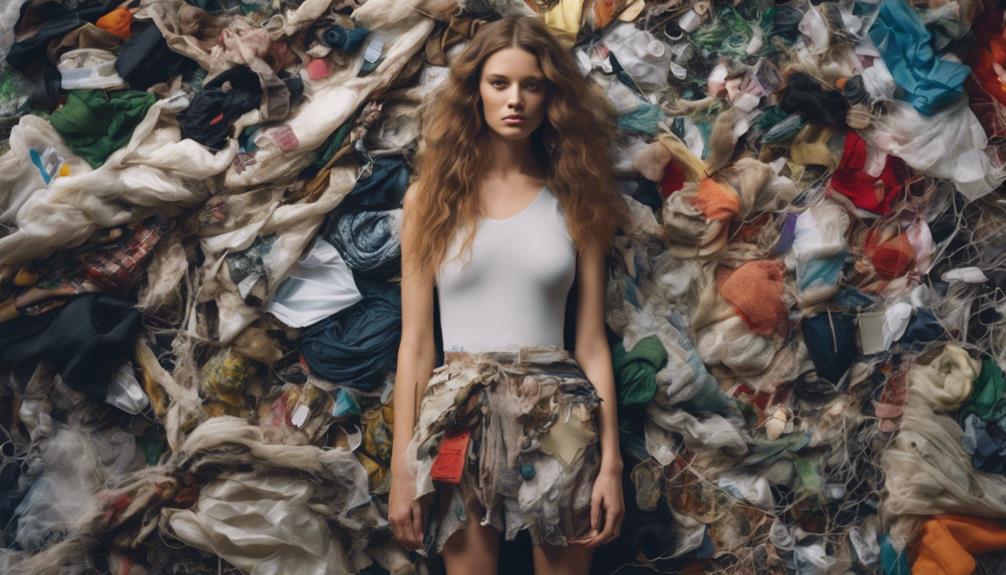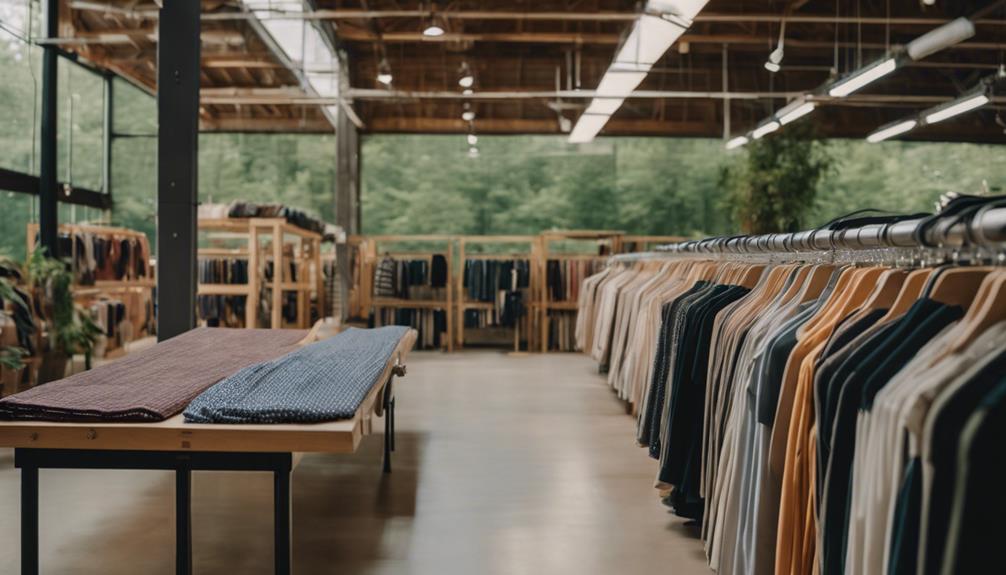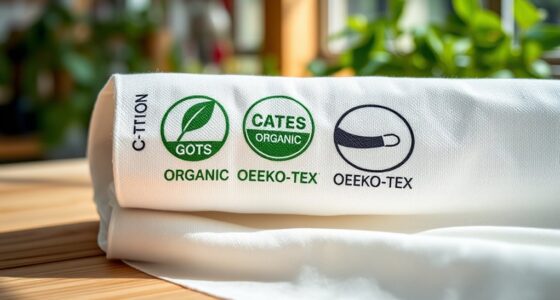Ethical and sustainable fashion focuses on creating clothing that respects both people and the planet. It ensures fair labor practices and safe working conditions while also minimizing environmental harm. This movement challenges the negative impact of the fast fashion industry, which creates large amounts of textile waste and exploits labor. By prioritizing eco-friendly materials and promoting a circular economy, ethical fashion aims to reduce the industry’s carbon footprint. You can make a difference by supporting brands that uphold these values. Interested in learning how your choices can make a positive impact on the industry? Stay tuned for more insights and tips on ethical and sustainable fashion!
Key Takeaways
- Sustainable fashion aims to create eco-friendly clothing that minimizes environmental impact and promotes a circular economy through recycling and upcycling practices.
- Ethical fashion ensures fair labor practices, safe working conditions, and transparency in the supply chain, countering exploitation in the fast fashion industry.
- The fashion industry is responsible for around 92 million tons of textile waste annually, highlighting the need for sustainable practices to reduce waste.
- Consumer choices play a crucial role, with many willing to pay more for ethically produced goods, driving brands to adopt sustainable and fair practices.
What Is Sustainable Fashion?
Sustainable fashion is all about creating clothing that meets our needs today without jeopardizing the environment for future generations. This movement has gained traction as more people recognize the ethical issues within the fashion industry, like its significant contribution to global greenhouse gas emissions. By promoting sustainable practices, the sustainable fashion movement aims to reduce this impact and foster a healthier planet. One way sustainable fashion practices achieve this is by using eco-friendly materials, such as organic cotton or recycled fabrics, and implementing ethical manufacturing processes. Additionally, sustainable fashion practices also emphasize the importance of reducing waste through recycling and upcycling, as well as promoting a circular economy within the industry. By adopting and supporting sustainable fashion practices, individuals can play a crucial role in preserving the environment for future generations.
Central to this approach is the concept of a circular economy. Instead of the traditional linear model of take-make-dispose, a circular economy encourages recycling and upcycling materials. This shift helps minimize waste, which is essential given that the fashion industry generates around 92 million tons of textile waste annually.
Sustainable fashion prioritizes the use of eco-friendly fabrics, such as organic cotton and hemp, which are renewable and free from harmful pesticides. Moreover, it emphasizes the importance of durability in garment design, encouraging you to invest in quality pieces that last longer.
Understanding Ethical Fashion

Ethical fashion focuses on guaranteeing fair labor practices and safe working conditions for everyone involved in the clothing supply chain. This movement emerged as a response to the fast fashion industry's exploitative practices, highlighting the need for corporate responsibility. It emphasizes transparency, encouraging brands to disclose their labor practices and material origins.
Here's a quick overview of the essential elements of ethical fashion:
| Principle | Description | Impact |
|---|---|---|
| Fair Trade | Guarantees equitable compensation for workers | Supports local economies |
| Worker Empowerment | Empowers marginalized communities | Promotes social justice |
| Safe Working Conditions | Prioritizes health and safety in the workplace | Reduces workplace accidents |
| Transparency | Brands disclose sourcing and manufacturing info | Builds consumer trust |
| Sustainable Sourcing | Uses eco-friendly materials | Promotes sustainable development |
As you can see, ethical fashion isn't just about the clothes you wear; it's about supporting a movement that values fair wages and responsible practices. By choosing ethical fashion, you contribute to a more equitable industry and promote sustainable development.
Environmental Impact of Fashion

Fashion's impact on the environment is staggering, with the industry accounting for 8-10% of global greenhouse gas emissions. This significant contribution to climate change calls for urgent action.
Every year, around 92 million tons of textile waste are generated, and much of it ends up in landfills, where it takes years to decompose. Fast fashion production methods exacerbate these issues, consuming over 2,700 liters of water for just one cotton t-shirt, leading to severe water scarcity.
Moreover, the dyeing and finishing processes often release toxic chemicals into waterways, harming local ecosystems and communities.
However, the rise of sustainable fashion brands offers a glimmer of hope. By embracing eco-friendly production methods and materials, these brands aim to reduce the environmental impact of fashion. Shifting to sustainable practices could cut the industry's carbon footprint by up to 30% by 2030.
As a consumer, you can make a difference by supporting sustainable brands and choosing quality over quantity. Every purchase you make can influence the industry's future and promote a healthier planet.
Social Impact of Fashion

The fashion industry often exploits workers through long supply chains, leading to unsafe conditions and unfair wages that demand urgent reform. Many laborers, especially in fast fashion, face hazardous environments, with incidents like the Rana Plaza collapse serving as stark reminders of this reality.
You might be surprised to learn that the ethical fashion industry is working tirelessly to change this narrative. Brands prioritizing ethical practices are creating a shift by treating production workers as partners. They guarantee safe working conditions and transparency in labor practices, fostering trust with consumers.
When you choose sustainable and ethical clothing, you're supporting an industry that values human rights and fair labor.
The Power of Consumer Choices

Your choices as a consumer can directly influence how brands operate and what they prioritize.
By opting for sustainable and ethical products, you drive demand for better practices and hold companies accountable.
This shift empowers you to support not just environmental responsibility but also social justice within the fashion industry.
Influencing Brand Practices
Consumer choices wield significant power to shape brand practices, especially as more shoppers prioritize ethical and sustainable options. A notable 66% of consumers are willing to pay more for products that align with these values. This shift in demand encourages brands to adopt sustainable practices and ethical production methods.
| Consumer Action | Impact on Brands |
|---|---|
| Choosing ethical brands | Drives the market towards sustainability |
| Sharing on social media | Amplifies awareness of responsible brands |
| Demanding transparency | Pushes brands to improve labor practices |
| Supporting humane practices | Fosters a more equitable fashion industry |
| Willingness to pay more | Signals a viable market for ethical fashion |
The rise of eco-conscious shopping habits, particularly among younger shoppers, emphasizes the need for brands to evolve. Social media platforms play an essential role in this transformation, enabling you to make informed choices that promote responsible production. By prioritizing brands that focus on transparency and environmental responsibility, you can influence industry standards and encourage a commitment to sustainable practices. Your choices matter—support the change you want to see in the fashion world!
Driving Sustainable Demand
Empowered by a growing awareness of environmental issues, shoppers are increasingly prioritizing sustainable and ethical choices in their purchasing decisions. You might be surprised to learn that 66% of consumers are willing to pay more for products that align with these values. This shift highlights the importance of supporting eco-conscious brands, especially as younger consumers demand transparency and ethical practices in the fashion industry.
Social media amplifies awareness, making it easier for you to discover and support brands that embody sustainable practices. By embracing the principles of Reduce, Rewear, and Repair, you can contribute to a culture of slow fashion, driving demand for responsible methods. This not only encourages brands to adopt more ethical practices but also fosters a sense of community around shared values.
Moreover, by choosing brands that address social issues like diversity and fair labor practices, you help create a more humane and equitable fashion industry. Your choices matter; they send a powerful message to brands about what you value. As more consumers like you prioritize sustainable and ethical options, the fashion landscape is bound to transform for the better.
Empowering Ethical Consumption
With every purchase, individuals wield the power to shape the fashion industry, driving brands towards more ethical and sustainable practices. A significant 66% of consumers are willing to pay more for ethical fashion, reflecting a strong demand for responsible choices. By embracing eco-conscious shopping, you not only support brands that prioritize sustainability but also encourage others to follow suit.
Social media amplifies awareness of ethical brands, especially among younger consumers who value sustainability. Your purchasing decisions can directly influence demand for sustainable practices, making behaviors like Reduce, Rewear, and Repair crucial in minimizing waste. When you choose to support brands that address social issues, such as racism and diversity, you're fostering humane practices within the industry.
The rise of eco-conscious shopping habits proves that increased consumer awareness can lead to a more equitable fashion market. Each time you opt for a brand committed to ethical fashion, you're contributing to a collective movement that pushes the industry toward better practices.
Challenges in Ethical Fashion

When you consider ethical fashion, you'll quickly notice the challenges it faces, like higher production costs that can drive up prices.
It's also tough to navigate the landscape due to greenwashing, where brands mislead consumers about their sustainability efforts.
These factors make it harder for you to make informed choices while balancing your budget and values.
Higher Production Costs
Higher production costs in ethical fashion stem from the need for sustainable materials, fair wages, and eco-friendly production methods, leading many consumers to find these garments pricier than fast fashion alternatives. On average, producing ethical clothing can be 20-30% more expensive than conventional garments. This is largely due to the investment in quality materials and ethical labor practices.
Additionally, the limited availability of sustainable materials further drives up costs. Many ethical brands focus on sourcing organic or recycled fabrics, which aren't produced as widely as conventional options. As a result, these brands often struggle to compete with established fast fashion giants, which benefit from economies of scale. This market imbalance makes ethical choices seem more expensive, discouraging some consumers from making sustainable purchases.
It's also important to critically evaluate claims of sustainability, as some brands may engage in greenwashing, falsely stating their practices to justify higher prices. By understanding these higher production costs associated with ethical fashion, you can make more informed choices that align with your values while supporting fair labor and eco-friendly production methods.
Greenwashing and Misleading Claims
Many consumers face the challenge of maneuvering greenwashing, where brands misrepresent their sustainability efforts to attract eco-conscious shoppers. It's estimated that about 60% of fashion brands engage in some form of greenwashing, making it tough to distinguish between genuine sustainable practices and mere marketing tactics.
You might find products labeled as 'carbon positive,' 'organic,' or 'vegan,' but often, these claims don't reflect the reality of their environmental impact. A significant portion of these items still rely on non-biodegradable, petroleum-based materials.
What's even more alarming is that many products marketed as sustainable end up in landfills. The fashion industry contributes a staggering 92 million tons of waste annually, highlighting that claims of sustainability are frequently unsubstantiated.
The lack of regulatory frameworks in the fashion sector allows companies to make misleading claims without accountability, leaving you at a disadvantage. As a consumer, it's crucial to educate yourself and demand transparency from brands.
Only by recognizing greenwashing can you make informed choices that truly align with ethical and sustainable fashion.
Evaluating Sustainable Brands

To effectively evaluate sustainable brands, explore the materials they use and prioritize those made from renewable and organic fibers. Look for items crafted from organic cotton, linen, and hemp, while steering clear of conventional cotton and virgin synthetics due to their significant environmental impact.
Next, assess the ethical labor practices upheld by these brands. Investigate whether they've certifications like Fairtrade, which signifies a commitment to safe working conditions and fair wages for employees. Transparency is also essential; a brand that openly shares its production processes and sourcing practices shows a genuine commitment to sustainability.
Don't forget to reflect on their shipping methods, too. Brands that minimize single-use plastics and other environmental harms during transportation demonstrate a more thorough approach to sustainability.
Lastly, utilize resources like Good On You to gain insights into various brands. This platform provides ratings based on their environmental and social impact, helping you make informed purchasing decisions.
Future Trends in Ethical Fashion

The future of ethical fashion is set to thrive as second-hand and rental markets gain popularity, offering sustainable alternatives that challenge the fast fashion model. You'll find that innovations in textile technology, like lab-grown materials and advanced recycling methods, are reshaping the landscape of eco fashion. These advancements are essential for producing items that align with ethical practices.
Expect to see a rise in collaboration between brands and environmental organizations, leading to initiatives focused on reducing the fashion industry's ecological footprint. Legislative changes will also play a significant role, pushing brands toward stricter environmental and social standards.
Check out the table below for a quick overview of these trends:
| Trend | Description | Impact |
|---|---|---|
| Second-Hand Markets | Increased access to pre-owned clothing | Reduces waste and consumption |
| Rental Services | Consumers can rent high-quality garments | Encourages sharing economy |
| Tech Innovations | Lab-grown materials and recycling methods | Enhances sustainability |
Strategies for Ethical Shopping

When you shop ethically, you not only support brands that prioritize transparency and fair practices, but you also contribute to a more sustainable future.
Focus on mindful purchasing habits by choosing quality over quantity and exploring second-hand options.
Mindful Purchasing Habits
Maximizing your existing wardrobe is a key strategy for practicing mindful purchasing and reducing your environmental impact. Before you buy new clothes, take inventory of what you already own. You might discover pieces that can be mixed and matched or revamped to fit your current style.
Shopping second-hand is another fantastic way to embrace sustainable practices. Thrift stores and online resale platforms aren't only budget-friendly but also help decrease waste in the fashion industry. Just remember to stay vigilant against greenwashing; not all brands that claim to be sustainable are genuine. Look for transparency and third-party certifications to identify ethical brands that align with your values.
When you do choose to shop, engage in mindful buying. Ask yourself critical questions about production methods, labor practices, and the materials used in the items you're considering. This way, you make certain your purchases support ethical and sustainable practices, contributing positively to the fashion landscape.
Supporting Ethical Brands
Supporting ethical brands starts with researching their labor practices and sustainability certifications to guarantee your purchases reflect your values. You'll want to look for certifications like Fairtrade or GOTS, as these indicate a commitment to ethical production. Additionally, shopping second-hand items can notably reduce waste while supporting a circular economy.
Here's a quick reference to help you choose ethical brands:
| Brand Type | Sustainability Certifications | Tips for Ethical Shopping |
|---|---|---|
| Established Brands | Fairtrade, GOTS | Use directories like Good On You |
| Small Ethical Brands | B Corp, OEKO-TEX | Prioritize eco-friendly options |
| Second-Hand Stores | N/A | Thrift shops or online platforms |
| Vintage Shops | N/A | Look for quality over quantity |
Engaging in mindful buying practices, such as maximizing your wardrobe and avoiding impulse purchases, can greatly lessen the demand for fast fashion. By supporting ethical brands, you drive positive change, fostering a more equitable and sustainable fashion industry.
Resources for Conscious Consumers

Conscious consumers now have access to a wealth of resources that make it easier to choose ethical and sustainable fashion options. Platforms like Good On You provide extensive brand ratings, evaluating their impact on people, planet, and animals. This helps you make informed choices about which ethical brands to support.
The Ultimate Ethical Fashion Guide is another valuable tool, offering insights and directories to identify trustworthy brands committed to sustainable practices. Many apps and websites have emerged to further educate you on sustainable fashion, allowing you to compare brand practices and align your purchases with your values.
Social media plays a vital role in raising awareness about ethical brands and practices, influencing your shopping habits and encouraging eco-conscious decisions. Additionally, the rise of second-hand and rental markets offers sustainable alternatives, with numerous online platforms dedicated to these options.
Whether you're looking to buy ethically produced items or explore second-hand treasures, these resources empower you to make choices that reflect your commitment to sustainability. By leveraging these tools, you can confidently navigate the fashion landscape as a conscious consumer.
Frequently Asked Questions
What Is Ethical and Sustainable Fashion?
When you think about ethical and sustainable fashion, consider brands that prioritize fair labor practices and eco-friendly materials. You'll notice the impact of your choices on the environment and society, promoting a healthier future for all.
What Does Ethical and Sustainable Mean?
Did you know the fashion industry contributes 8-10% of global greenhouse gas emissions? Ethical and sustainable mean prioritizing fair labor and environmental practices, ensuring both people and the planet thrive through responsible sourcing and production methods.
What Is a Simple Definition of Sustainable Fashion?
Sustainable fashion means creating clothing and accessories that minimize environmental impact by using eco-friendly materials and methods. It encourages responsible production and consumption, ensuring future generations can enjoy a healthy planet and diverse ecosystems.
What Is the Problem With Sustainable Fashion?
The problem with sustainable fashion is many brands still contribute to environmental harm, often through greenwashing. You'll find low-cost fast fashion dominates, making it hard for genuinely eco-friendly alternatives to thrive in the market.
Conclusion
In a world where fashion choices can either harm or heal, embracing ethical and sustainable practices isn't just a trend—it's a responsible lifestyle.
Embracing ethical and sustainable practices means being mindful of the impact our fashion choices have on the environment, as well as the lives of the people involved in the production process. It’s about choosing clothing made from eco-friendly materials, supporting fair trade, and advocating for transparency in the fashion industry. That’s why sustainable fashion is important; it’s about making conscious decisions that benefit not only ourselves, but also the planet and the communities that are affected by the fashion supply chain. By supporting sustainable fashion, we can contribute to a more equitable and environmentally friendly industry.
By supporting brands that prioritize the planet and people, you can make a real difference.
So, why not take a moment to reflect on your wardrobe? Every choice you make sends a message about your values.
Together, we can shape a brighter future for fashion that aligns with our commitment to sustainability and ethics.









